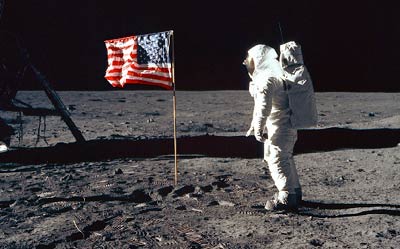Oriana Fallaci on the way to the Moonby Taylor Dinerman
|
| For her, the great questions are: where are we going, and why? What kind of heroes will it take to get us there? |
So why did this woman in 1964 fly to America to write about the space program? She was not much interested in the technical details, though she does write amusingly about her encounters with a centrifuge and her visit to San Antonio’s School of Aerospace Medicine. She mischievously laid out plans with a couple of NASA employees from the Cape to fly to the Moon to steal all the cheese (Project Cheese). In Houston she carefully noted the effect a young male scientist has on a lingerie model during a lunchtime fashion show. Sometimes she comes off as a mythical sprite who passes through men’s lives leaving chaos and laughter behind, but that is not her main motive for writing this book.
For her, the great questions are: where are we going, and why? What kind of heroes will it take to get us there? These questions form the core of this book. Written as a series of missives to her beloved father, who dislikes the whole endeavor, she tries to get astronauts like Deke Slayton and Alan Shepard to expose their innermost selves. She discovers that Slayton flew bombing missions against her hometown of Florence during the war, and may even have dropped the bombs that injured her. Shepard seems more interested in selling her a cow or horse from his ranch than in submitting himself to an analysis of his feelings and ambitions.
Best of all is her encounter with Pete Conrad, she asks him to “…say anything you like. Except one thing: that you’ve dreamed of flying ever since you were a child. I’ve already heard that from six or seven of them. If you say it too, I’ll open that window and jump out.” He bounded like a cat, and flung open the window: “Jump.” She finally met an astronaut who matched her own wicked, witty sense of humor.
What fascinates the reader about this book is the way she retells the old story of the encounter between the young, brash, boisterous, idealistic Yanks and the cynical old European, but Fallaci is brash, idealistic, and at the same time in her own wonderfully twisted way cynical. She refuses to let herself be confined in any of the old world’s many straightjackets. Still, for her the astronauts and the other people of NASA were very American indeed: “…they don’t even know about hunger, prisons. Fear, firing squads, hatred, rancor, the inability to use that stupid useless illogical coward word forgiveness. And it’s right, Father, that it should be so.”
| What fascinates the reader about this book is the way she retells the old story of the encounter between the young, brash, boisterous, idealistic Yanks and the cynical old European. |
She explains to her father that she has established a home in New York with “air conditioning, microphones, levers, buttons, chutes, portable television sets,” all things that her father abhors. It was in New York on September 11th 2001 that her life was shattered and that she again found herself fighting for her ideals. She has done so without mercy and without restraint, for her obviously the war on terror is as real a war as World War Two. Her articles horrify Europe’s elites the same way Bush’s speeches tend to, yet her books and articles sell like the proverbial hot cakes.
She has long ago put the space program behind her, but she has left us this curious book, a ramble though NASA as it was in 1964. The agency long ago lost the fine patina of naive idealism that led so many of America’s best scientists and engineers to be ready to sacrifice so much for it just so they could say “I was there!” Maybe there is still some of that spirit left, and perhaps Mike Griffin will know how to tease it out.
